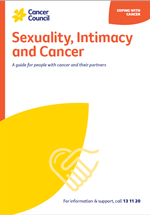- Home
- Cancer Information
- Managing side effects
- Sexuality, intimacy and cancer
- Overcoming specific challenges
- Anxiety
Anxiety
Feeling anxious and scared is a normal reaction to finding out that you have cancer and going through treatment. Thinking about intimacy or having sex may also make you feel anxious. You may worry about how you look, how your partner will respond or how your body will perform, dread being touched, or fear that sex will be painful. If you’re single, you may also feel worried about starting a new relationship.
Anxiety may affect your self-esteem and as a result you may lose interest in sex or find yourself avoiding it. You may feel less anxious if you find out more about your cancer and ask your treatment team what to expect. Think about how you have managed stressful situations in the past, and discuss these strategies with your partner or a trusted family member or friend.
Tips for managing anxiety
- Try mindfulness techniques, relaxation or meditation. Relaxing your body and mind often helps you feel more in control and able to cope with fear, tension and anxiety. Listen to our relaxation and meditation podcast below.
- If your thoughts are unhelpful or hard to control, consider cognitive behaviour therapy (CBT). This can show you how to change thought patterns that might be getting in the way of a fulfilling sex life. A psychologist or counsellor can help. Ask your GP for a referral – you may be eligible for a Medicare rebate.
- Share your thoughts with your partner. It shows trust and helps create intimacy.
- Talk to your doctor about whether medicine may help manage your anxiety. However, some medicines may lower your libido.
→ READ MORE: Sadness and depression
Podcast: Find Calm During Cancer
Listen to more of our meditation and relaxation podcast
More resources
Dr Margaret McGrath, Head of Discipline: Occupational Therapy, Sydney School of Health Sciences, The University of Sydney, NSW; Yvette Adams, Consumer; Dr Kimberley Allison, Out with Cancer study, Western Sydney University, NSW; Andreea Ardeleanu, Mental Health Accredited Social Worker, Cancer Counselling Service, Canberra Health Service, ACT; Kate Barber, 13 11 20 Consultant, Cancer Council Victoria; Dr Kerrie Clover, Senior Clinical Psychologist, Psycho-Oncology Service, Calvary Mater Newcastle, NSW; Maree Grier, Senior Clinical Psychologist, Royal Brisbane and Women’s Hospital, QLD; Mark Jenkin, Consumer; Bronwyn Jennings, Gynaecology Oncology Clinical Nurse Consultant, Mater Health, QLD; Dr Rosalie Power, Out with Cancer study, Western Sydney University, NSW; Dr Margaret Redelman OAM, Medical Practitioner and Clinical Psychosexual Therapist, Sydney, NSW; Kerry Santoro, Prostate Cancer Specialist Nurse Consultant, Southern Adelaide Local Health Network, SA; Simone Sheridan, Sexual Health Nurse Consultant, Sexual Health Services – Austin Health, Royal Talbot Rehabilitation Centre, VIC; Prof Jane Ussher, Chair, Women’s Heath Psychology and Chief Investigator, Out with Cancer study, Western Sydney University, NSW; Paula Watt, Clinical Psychologist, WOMEN Centre, WA.
View the Cancer Council NSW editorial policy.
View all publications or call 13 11 20 for free printed copies.
Need to talk?
Support services
Coping with cancer?
Speak to a health professional or to someone who has been there, or find a support group or forum
Life after cancer treatment
Webinars, exercise and nutrition, sexuality programs, and back-to-work support
Cancer information
Your coping toolbox
Strategies for managing difficult situations during and after cancer treatment
View our publications
Guides and fact sheets for people with cancer, their families and friends

